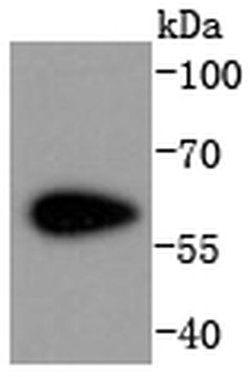Learn More
Invitrogen™ CDK8 Recombinant Rabbit Monoclonal Antibody (SN2030)
Rabbit Recombinant Monoclonal Antibody
Supplier: Invitrogen™ MA532343
Description
Recombinant rabbit monoclonal antibodies are produced using in vitro expression systems. The expression systems are developed by cloning in the specific antibody DNA sequences from immunoreactive rabbits. Then, individual clones are screened to select the best candidates for production. The advantages of using recombinant rabbit monoclonal antibodies include: better specificity and sensitivity, lot-to-lot consistency, animal origin-free formulations, and broader immunoreactivity to diverse targets due to larger rabbit immune repertoire.
CDK8 phosphorylates the carboxy-terminal domain of the largest subunit of RNA polymerase II. This protein is coexpressed and copurified with Cyclin C. CDK8 is part of a family of proteins designated as cdks are critical regulators of cell cycle progression. The prototype member of this family, p34/Cdc 2, and a related protein Cdk 2, function late in the cycle while Cdk 4 and Cdk 6 are critically involved in G1 to S progression. Because of analogy with yeast Cdk 8, it has been proposed that the human Cdk 8 Cyclin C may interact with RNA polymerase, thus influencing the transcription mechanism(s) that lead to cell division.
Specifications
| CDK8 | |
| Recombinant Monoclonal | |
| 1 mg/mL | |
| TBS with 0.05% BSA, 40% Glycerol and 0.05% sodium azide; pH 7.4 | |
| P49336, Q8R3L8 | |
| Cdk8 | |
| Synthetic peptide within Human CDK8 aa 1-50. | |
| 100 μL | |
| Primary | |
| Human, Mouse, Rat | |
| Antibody | |
| IgG |
| Western Blot | |
| SN2030 | |
| Unconjugated | |
| Cdk8 | |
| Cdk8; CDK8 protein kinase; cell division protein kinase 8; Cell division protein kinase 8-like protein; cyclin dependent kinase 8; cyclin-dependent kinase 8; K35; mediator complex subunit CDK8; Mediator of RNA polymerase II transcription subunit CDK8; MGC126074; MGC126075; protein kinase K35; RGD1560888; wu:fk95h11 | |
| Rabbit | |
| Protein A | |
| RUO | |
| 1024, 264064, 498140 | |
| Store at 4°C short term. For long term storage, store at -20°C, avoiding freeze/thaw cycles. | |
| Liquid |
Your input is important to us. Please complete this form to provide feedback related to the content on this product.
